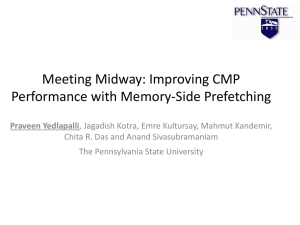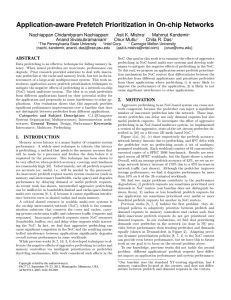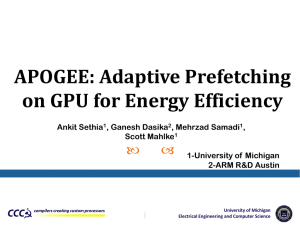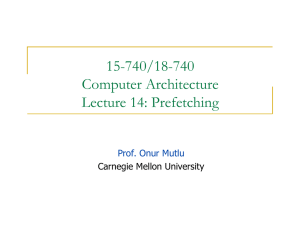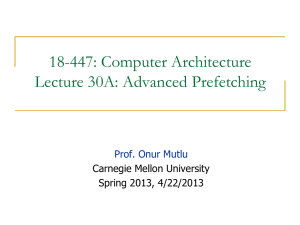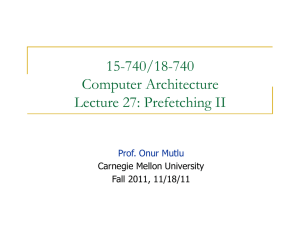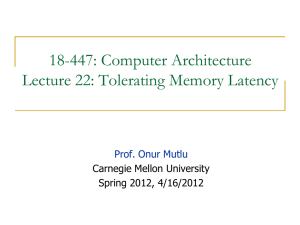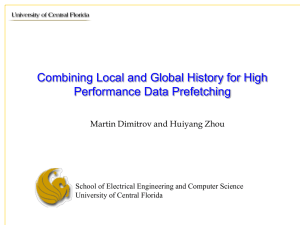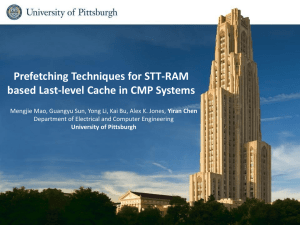prefetch
advertisement
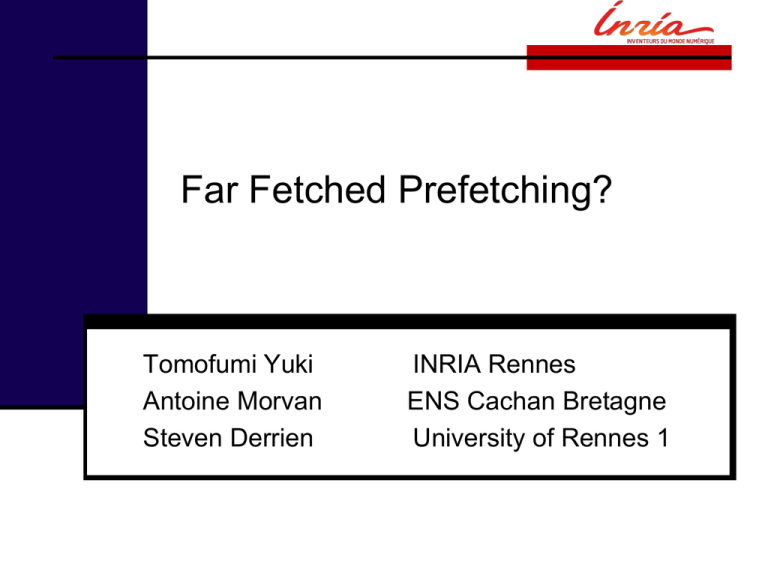
Far Fetched Prefetching? Tomofumi Yuki Antoine Morvan Steven Derrien INRIA Rennes ENS Cachan Bretagne University of Rennes 1 Memory Optimizations Memory Wall Memory improves slower than processor Very little improvement in latency Making sure processors have data to consume Software: tiling, prefetching, array contraction Hardware: cache, prefetching Important for both speed and power Further memory takes more power 2 Prefetching Anticipate future memory accesses and start data transfer in advance Both HW and SW versions exist Hides latency of memory accesses Cannot help if bandwidth is the issue Inaccurate prefetch is harmful Consumes unnecessary bandwidth/energy Pressure on caches 3 This talk A failure experience based on our attempt to improve prefetching We target cases where trip count is small Prefetch instructions must be placed in previous iterations of the outer loop Use polyhedral techniques to find where to insert prefetch 4 Outline Software Prefetching When it doesn’t work Improving prefetch placement Code Generation Simple Example Summary and Next Steps 5 Software Prefetching [Mowry 96] Shift the iterations by prefetching distance Simple yet effective method for regular computations for (i=-4; ; i++) Prologue prefetch(A[i+4]); for (i=0; ; i++) … = foo(A[i], …) prefetch(A[i+4]); for (i= ; i<N; i++) … = foo(A[i], Epilogue …) for (i=0; i<N; i++) … = foo(A[i], …) prefetch distance = 4 6 [Lee, Kim, and Vuduc HiPEAC 2013] When Prefetching Works, When It Doesn’t, and Why Difficult to statically determine prefetching distance They suggest use of tuning Not the scope of our work Interference with HW prefetchers Cannot handle short stream of accesses Limitation for both software and hardware We try to handle short streams 7 Problem with Short Streams When N=5 Most prefetches are issued “too early” Not enough computation to hide the latency Simply translating iterations in the innermost loop is not sufficient for (i=-4; i<0; i++) prefetch(A[i+4]); for (i=0; ; i++) … = foo(A[i], …) prefetch(A[i+4]); for (i= ; i<5; i++) … = foo(A[i], …) prefetch distance = 4 8 2D Illustration Large number of useless prefetches j i 9 Lexicographical Shift The main idea to improve prefetch placement j i 10 Outline Code Generation Polyhedral representation Avoiding redundant prefetch Simple Example Summary and Next Steps 11 Prefetch Code Generation Main Problem: Placement Prefetching distance Manually given parameter in our work Lexicographically shifting the iteration spaces Avoid reading the same array element twice Avoid prefetching the same line multiple times We use the polyhedral representation to handle these difficulties 12 Polyhedral Representation Represent iteration space (of polyhedral programs) as a set of points (polyhedra) Simply a different view of the program i=N j i=j for (i=1; i<=N; i++) for (j=1; j<=i; j++) S0 Domain(S0) = [i,j] : 1≤j≤i≤N S0 j=1 Manipulate using convenient polyhedral N i representation, and then generate loops 13 Transforming Iteration Spaces Expressed as affine transformations Shifting by constant is even simpler Example: Shift the iteration by 4 along j (i,j→i,j-4) j Domain(S0) = [i,j] : 1≤j≤i≤N S0 Domain(S0’) = [i,j] : 1≤i≤N && -3≤j≤i-4 S0’ N i 14 Lex. Shift as Affine Transform Piece-wise affine transformation (i,j→i,j-1) if j>1 or i=1 (i,j→i-1,i-1) if j=1 and i>1 Apply n times for prefetch distance n j Domain(S0) = [i,j] : 1≤j≤i≤N n S0 S0’ Domain(S0’) = [i,j] : <complicated> N i 15 Avoiding Redundant Prefetch: Same Element Given: Target array: A Set of statement instances that read from A Array access functions for each read access Find the set of first readers: Statement instances that first read from each element in A Find the lex. min among the set of points accessing the same array 16 Avoiding Redundant Prefetch: Same Cache Line Let an element of array A be ¼ of a line. The following prefetches the same line 4 times for i … prefetch(A[i+4]); … = foo(A[i], …); We apply unrolling to avoid redundancy for i … prefetch(A[i+4]); … = foo(A[i], …); … = foo(A[i+1], …); … = foo(A[i+2], …); … = foo(A[i+3], …); 17 Outline Simple Example Simulation results Summary and Next Steps 18 Simple Example Contrived example that better work for(i=0; i<N; i+=1) for(j=0; j<M; j+=1) sum = sum + A[i][j]; Expectation: when M is small and N is large, lexicographical shift should work better Compare between unroll only Mowery prefetching (shift in innermost) Proposed (lexicographic shift) 19 Search for Simulators Need simulators to experiment with Memory latency Number of outstanding prefetches Line size, and so on Tried on many simulators XEEMU: Intel Xscale SoCLib: SoC gem5: Alpha/ARM/SPARC/x86 VEX: VLIW 20 Simulation with VEX (HP Labs) Miss penalty: 72 cycles cycles misses prefetche s effective speedup original 658k 2015 - - - unroll 610k 2015 - - 1.08 mowry 551k 1020 2000 992 1.19 lex. shift 480k 25 2001 1985 1.37 We see what we expect Effective: number of useful prefetches But, for more “complex” examples, the benefit diminishes (<3%) 21 Lex. Shift was Overkill Precision in placement does not necessary translate to benefit Computationally very expensive Power of piecewise affine function by the prefetch distance Takes a lot of memory and time High control overhead Code size more than doubles compared to translation in the innermost loop 22 Summary Prefetching doesn’t work with short streams Epilogue dominates Can we refine prefetch placement? Lexicographic Shift Increase overlap of prefetch and computation Can be done with polyhedral representation But, it didn’t work Overkill 23 Another Possibility Translation in outer dimensions j i Keeps things simple by selecting one appropriate dimension to shift Works well for rectangular spaces 24 Coarser Granularity Lexicographic shift at statement instance level seems too fine grained Can it work with tiles? Prefetch for next tile as you execute one 25 Thank you 26
